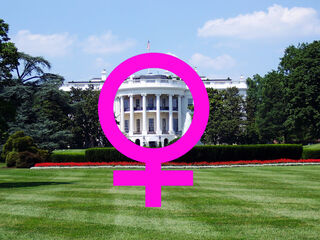Gender
Gender Equity Comes to the White House
How the Gender Policy Council is a step forward for women.
Posted July 10, 2021 Reviewed by Vanessa Lancaster
Key points
- Biden announced the formation of the White House Gender Policy Council (GPC), which would provide female perspective to the White House affairs.
- President Biden established the GPC to advance gender equity and equality in domestic and foreign policy development and implementation.
- The GPC lays an essential role in the President's efforts to advance equity in government policy for those facing discrimination and bias.

The White House will soon have a Gender Policy Council. To celebrate International Women's Day on March 8, President Joe Biden announced the formation of the White House Gender Policy Council, which would discuss current feminist issues in America and provide female perspectives to White House affairs. The council would potentially be a step forward for American women. Still, it seems to be more of a performative act to prevent real change from occurring on a federal level.
Having the first-ever female vice president is not the solution to feminist concerns and simply forming a federal council for women is not a cure-all. The council is a reformation of the White House Council on Women and Girls, created under the former Obama administration. It is intended to provide Biden with a feminist perspective as he makes decisions.
President Biden established the Gender Policy Council (GPC) to advance gender equity and equality in domestic and foreign policy development and implementation. The White House website describes this newly established council's function and the reach of this newly established council.
The GPC covers a range of issues—including economic security, health, gender-based violence, and education—focusing on gender equity and equality and particular attention to the barriers faced by women and girls. It also plays an essential role in the President's efforts to advance equity in government policy for those facing discrimination and bias based on multiple factors, including members of the Black, Latina, Native American, AAPI, and LGBTQI+ communities well as persons with disabilities.
Hilary Clinton said the council is a "critical first step" toward helping women. A current example of the disparity of men's and women's work was under the microscope during the pandemic. More women suffered an economic blow than men, resulting in a long-term loss for women. From daily interactions to federal policies, women experience a different treatment that continues to be a significant disservice to women. There has been so much dialog on systemic sexism and racism, but the change to level the playing field moves slowly.
In 1997, Hilary Clinton organized a conference on child care to examine the challenges and request federal funding for programs like Head Start and tax incentives for corporations. At the time, she asked the treasury secretary, Robert Rubin, to start the panel. His reaction was illustrative of the great child care divide between men and women and who bear child care responsibility. Both men and women should share equally the responsibility for the care of children. Rubins was puzzeled by the request. Mrs. Clinton recalled that he probably thought her request was outside the box. Of course, in the end, he agreed. However, the broader issue was for men to make so-called women's rights a priority. This move by Mrs. Clinton set up a necessary step and precedent for future administrations.
The goal of this movement is to institutionalize legislative and regulatory changes. For fifty years, the ERA still has not passed, and possibly with the new Gender Policy Council, the long-overdue focus on women's rights will take center stage. Maybe with the government behind these necessary changes, more equity will be implemented to allow women full access to all that men have experienced and been awarded.
References


